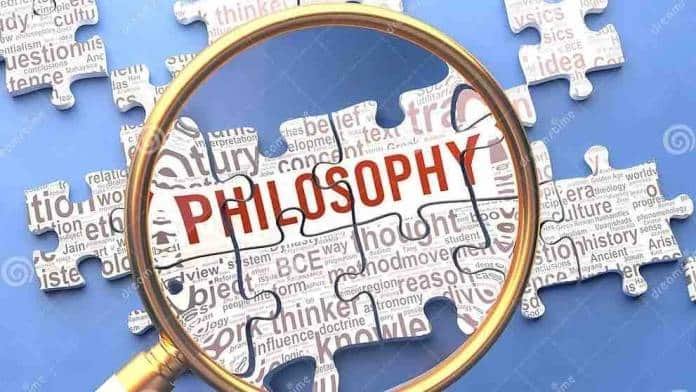Before we dive into eastern or western philosophy, let’s talk about philosophy. What it means and why is it important?
What is philosophy?
A simple definition of philosophy is the study of the basic ideas about knowledge, truth, right and wrong, religion, and meaning of life. Quite literally, the word ‘philosophy’ means “love of wisdom.” Ms. Rucha Joshi, Assistant professor for philosophy at SIES college of Arts, Science, and Commerce, expressed, “Our love for wit and wise is philosophy.” She further added, “For me, philosophy is our unending thirst to gain knowledge. It is our intellectual curiosity that allows us to be wise; this curiosity can be satiated through words and life experiences in equal measure and the humankind’s ability to always seek is what defines philosophy for me.”
Why is philosophy important?
This brings us to our next question that needs to be answered: why is philosophy important? Noam Chomsky, the father of modern linguistics, and a major figure in analytic philosophy, quoted, “The world is a very puzzling place. If you are not willing to be puzzled, you just become a replica of someone else’s mind.” Questions are essential to find answers, and philosophy is about asking the important questions. Whether it’s finding the meaning of existence and life, wondering whether God is real, or justifying human rights, philosophy has always steered humanity’s curiosity. It is equally important to question and sort your own beliefs. Philosophy inspires and pushes us to take a deeper look at our own lives and beliefs.
Everything you need to know about Eastern philosophy
Eastern philosophy is believed to be originated in the Middle East or Asia. When you look at the eastern philosophies, you will observe how philosophical beliefs coincide with religious beliefs. Chasing the questions of philosophy, the eastern philosophers try to answer the meaning and values of existence, reality and life, and morality and ethics. Since eastern philosophy majorly coincides with religion, the following five eastern philosophies are to be considered:
1.Hinduism The core beliefs of Hinduism are Dharma, Karma, and reincarnation. The basic tenets of Hinduism are laid down in scared texts such as Vedas, Upanishads and Bhagwat Gita. The purpose of life is to understand existence through dharma and karma, and the goal of Hinduism if to achieve Moksha.
2.Islam It is based on the belief that the quest for knowledge is commanded by Allah. Islamic philosophers are divided by how they interpret the Quran. It is argued by the Muslims that there is no need of further reflection or study of philosophy. Others argue that philosophy is important to understand Allah and Quran.
3.Buddhism Buddhism originated from Hinduism. Siddhartha Gautama, its founder, now called Buddha, or the Enlightened One, was on a quest to understand why there is suffering in the world. The four noble truths and the eightfold path became the basis of Buddhism.
4.Confucianism Confucianism is rooted in the teachings of Confucius (Kong Fuzi) and his followers. Key principles include filial piety (respect for ancestors and elders), the importance of moral virtue, and the cultivation of a harmonious society through proper conduct and education.
5.Taoism Taoism, a foundational element of Eastern philosophy, centres around the Tao, often translated as the “Path.” It embodies an understanding of the natural order, balance, and harmony. Taoism encourages individuals to align with the Tao, seeking balance rather than force, and embracing the concept of wu wei, or effortless action.
Origin and philosophers of the western philosophy
Originating in ancient Greece, Western philosophy seeks to answer questions about morality, reality, and the boundaries of human knowledge. It emerged from Plato and Aristotle, shaping ethics, epistemology, and metaphysics. Later the Renaissance revived classical ideas coincide with humanism. In the modern world, Western philosophy reflects on questions about society, existence, morality, and knowledge. The Western philosophy has various great philosophers whose impact remains. Socrates, the father of Western philosophy, laid down the foundation for critical thinking and ethical enquiry. Another great philosopher, Plato, who was the student of Socrates, is best known for his theories of forms, known as Platonism. In addition, Aristotle, student of Plato, contributed to ethics, metaphysics, biology, and politics. Western philosophy is commonly divided into 6 branches: Metaphysics, Epistemology, Ethics, Aesthetics, Logic, and Politics.
Eastern vs. Western philosophy: An overview Other than the geographical aspects, that is, Eastern philosophy prevailing mostly is Asia, whereas, Western philosophy having its roots in the west, they differ in various other ways. Eastern philosophy circles around religions like Hinduism, Islam, Buddhism etc, while on the other hand, Western philosophy does not have any such links with religion. Western philosophy places a stronger emphasis on logic, reason, knowledge, and ethics. Further, Eastern philosophy focuses on transcending the individual self to achieve spiritual enlightenment or liberation. Whereas, Western philosophy sees ‘self’ as distinct and separate from the external world.
Philosophies and Gen-Z Knowledge is just mere text if it is not applied in a practical way for a purpose? How can we, millennials, or gen-z, can use it? According to Ms. Rucha Joshi, “The Gen Z can use Philosophy as it was intended to; to think critically. We live in a world of cancel culture and work activism, and often forget the art of rhetoric. I truly feel that if Gen Z applied Philosophy to educate, rather than cancel, the online world would be a kinder place to be in.” Starting with Buddhism, learning the four noble truths and the eightfold path can help gain insights about suffering, compassion, and mindfulness in daily lives. Yoga and physical wellness (eastern philosophy) could be a big part of our lives in emphasizing the body-mind connection. In this fast-paced and chaotic world, a moment of peace could always be used. Humanism (western philosophy) helps us to advocate human rights, and ethical behaviour in our community. Gen-z being the most considerate for LGBTQ+ rights, humanism plays a big part in it.
By, Mansi Priya
